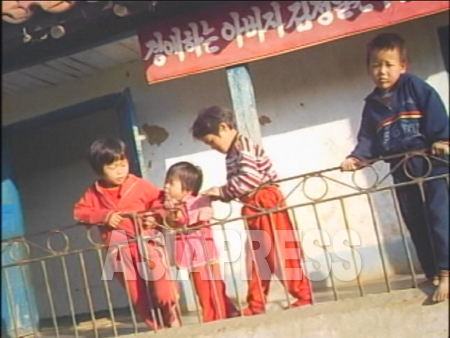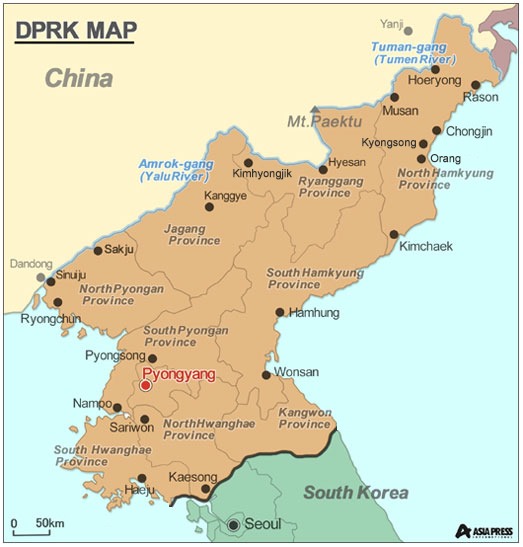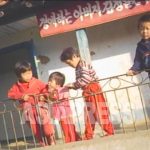
ASIAPRESS recently conducted research on marriage and childbearing in North Korea, which revealed that the decline in fertility is worse than previously known. Marriage avoidance and late marriages are widespread among women, and even when they do marry, the prevailing attitude is to have few or no children. North Koreans seem to be unconcerned by government appeals for people to display their patriotism by having more children. In this three-part series, ASIAPRESS looks beyond the headlines to understand the current state of North Korea's low birth rate. (JEON Sung-jun / KANG Ji-won)
◆ North Korea’s long-standing low fertility issue is worse than previously known
The United Nations Population Fund (UNPFA) has revised North Korea's total fertility rate downward to 1.8 from 1.9 in 2022 in its 2023 State of the World Population report. While this is a conservative estimate for a country so closed off from the outside world, it's still below the 2.1 replacement fertility rate that is typically required to sustain a population.
Some researchers believe that North Korea's fertility rate is likely even worse. A December 2023 report from the Bank of Korea's North Korea Economic Research Center estimated North Korea's total fertility rate in the 2010s at 1.38. Based on a survey of 95 North Korean defectors and the marriage and childbearing experiences of 1,137 of their relatives and acquaintances, the results suggest that North Korea has long faced a low fertility problem.
Reports from ASIAPRESS's reporting partners reveal the severity of the problem.
"It's hard to see anyone carrying a child now. Even the local daycare center, which originally had a capacity of 38 children, said there were only 21 children last year (2023)." (reporting partner, Ryanggang Province)
◆ North Korea’s low fertility: a riddle
Fertility rates are typically higher in low-income countries and gradually decline as income increases. As of 2023, the average combined fertility rate for low-income countries (those with less than USD 1,135 per capita) as categorized by the World Bank is 4.47, nearly three times the average combined fertility rate of 1.57 for high-income countries (those with more than USD 13,845 per capita).
North Korea's fertility rate in the low-income group is similar to that of France (1.8 in 2021) and, as some experts argue, below the average fertility rate of high-income countries. North Korea's unusually low fertility rate is a highly unusual phenomenon, rarely seen outside of exceptional circumstances such as natural disasters or war.
Let's take a look at this phenomenon through the reporting by three reporting partners. Reporting partners "A," "B," and "C" are all married women in their 30s and 50s living in the northern part of the country, and "A" and "B" are raising children.

◆ Women who marry are fools, and stupid if they have babies
All of the reporting partners agreed with the phrase that "a woman who marries is a fool, and is an idiot if she has children." The phrase sums up North Korean women's views on marriage and childbearing.
In North Korea, where negative sentiment toward unwed mothers and out-of-wedlock marriages is deeply rooted, it is very rare for an unmarried woman to have a child, so fertility is directly linked to marriage. But as women become more aware of the sacrifices marriage requires of them, many are delaying or avoiding marriage altogether, the reporting partners said.
"Nowadays, it is rare for people to get married even if they're in a romantic relationship, and women who have some money often live alone." ("A")
Reporting partner "B" said that women generally believe that "it's hard enough to make a living on your own, so you'd have to be stupid to (have a child) because you'd have to feed him or her."
She added that "it used to be common for women to move from being a dependent to a member of the Socialist Women's Union of Korea after marriage, but nowadays, three out of ten members of the women's union are women who live alone."
"B" explained that as many women have been able to save money through earnings they make in the markets, more women are avoiding marriage, which would force them to support men who make little income at work. While the Socialist Women's Union was long seen as an organization for married women, it has a gradually increasing number of unmarried women.
※ In North Korea, housewives who do not work must be part of the Socialist Women's Union of Korea.
(To 2 >>)
※ ASIAPRESS communicates with its reporting partners through Chinese cell phones smuggled into North Korea.

- <Inside N. Korea> Overseas worker deployments accelerate, some leave within a month...There’s a surge in applicants amid hardship
- <Investigation Inside N. Korea> A shocking situation...How are the neglected elderly faring? (1) Poverty-stricken elderly people live off begging and wander the streets
- <Inside N. Korea> Implementation of the large-scale restructuring of trading companies (1) Called “anti-socialist hotbeds,” government forces ‘bases’ of trading companies to close down and consolidate
- <Inside N. Korea> Regime tightens reigns on young people...A public trial and ideological struggle in February led to intensive attacks and forced participation in firing squads
- <Inside N. Korea> Workers frustrated by worsening workplace rations…Some call out company officials in rare rebuke

























